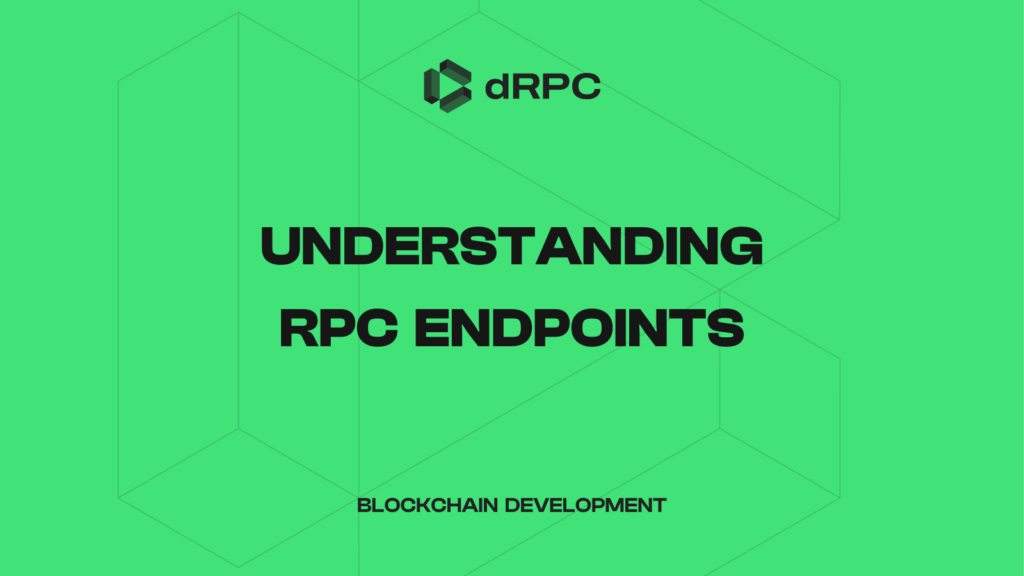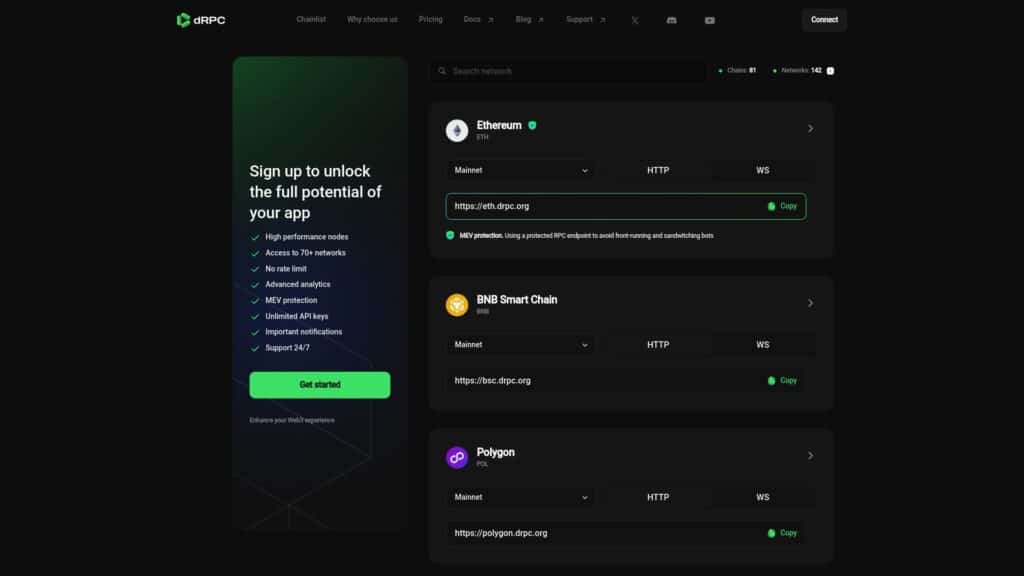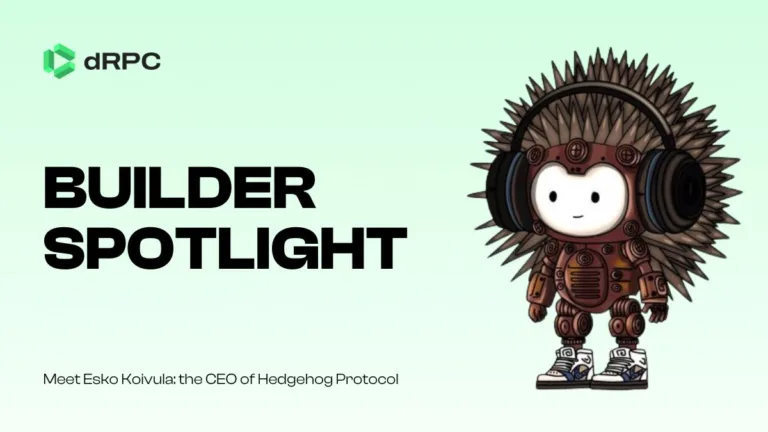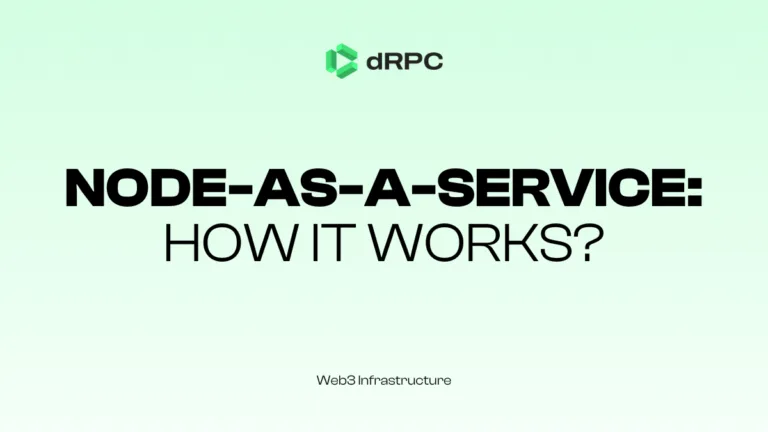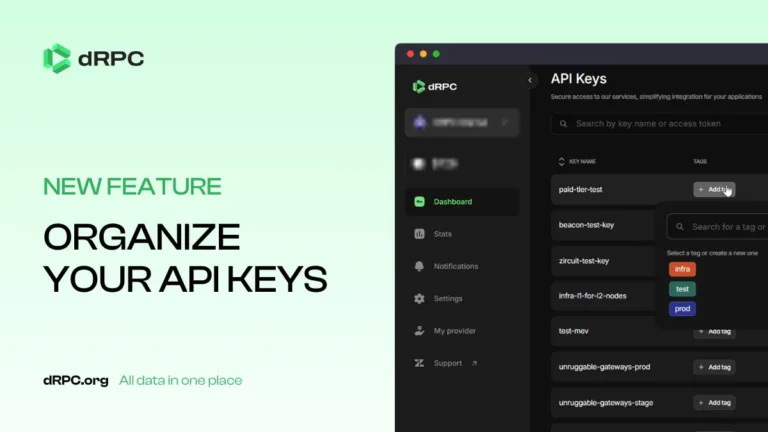This article aims to deepen your understanding of RPC endpoints—key communication bridges to blockchain networks. Discover how they optimize performance, enhance scalability, and strengthen security.
What Are RPC Endpoints?
RPC (Remote Procedure Call) endpoints are essential components of blockchain technology that enable seamless communication and functionality. Here’s why they matter:
- They Act as Communication Bridges: RPC endpoints connect decentralized applications (dApps), smart contracts, and nodes. This enables the execution of functions and retrieval of data on blockchain networks like Ethereum and Solana.
- They Provide Access to Blockchain Data: RPC endpoints allow dApps to interact with blockchain networks. Without them, your application would be unable to send or receive information from the blockchain.
- They Support Decentralization: By facilitating remote calls, RPC endpoints help maintain the distributed nature of blockchain systems, ensuring they function effectively and efficiently.
Understanding RPC endpoints is crucial for leveraging blockchain technology effectively. They play a key role in making dApps run smoothly and empower developers to build scalable, robust applications.
In essence, RPC endpoints are the backbone of the decentralized web, enabling data access and functionality that drive the blockchain ecosystem.
How RPC Endpoints Work
They act as the communication bridge between decentralized applications (dApps) and the blockchain. This connection allows dApps to interact with smart contracts and access blockchain data seamlessly.
Here’s how RPC endpoints facilitate communication:
- Request Handling: When a dApp needs to perform a function or retrieve data, it sends an RPC request. This request is routed through the RPC endpoint to the appropriate blockchain node.
- Data Exchange: The blockchain node processes the request, executing any necessary functions or retrieving the required data. This information is then sent back through the RPC endpoint to the dApp.
- Function Execution: Smart contracts interact with blockchain nodes via RPC endpoints. This ensures that dApps can execute complex transactions and operations efficiently.
Understanding this process highlights the importance of RPC endpoints. They ensure that decentralized systems operate smoothly by managing data retrieval and function execution. This seamless interaction is vital for maintaining the integrity and performance of dApps.
At dRPC, we enhance this process with features like AI-driven load balancing and front-running protection. Our globally distributed network offers low-latency access and unlimited scalability, supporting over 70 blockchains. This ensures that your applications perform optimally, regardless of workload. For more detailed information on how our platform operates and supports your development needs, you can explore our comprehensive documentation for dRPC.
Public vs Private RPC Endpoints
Public and private RPC endpoints serve distinct roles in blockchain development. Public RPC endpoints are accessible to everyone. They’re great for testing and development because they let multiple users share resources. But, they might not offer the scalability or support needed for larger projects.
Private RPC endpoints are different. They’re restricted to specific users or applications, making them more secure and reliable. They handle higher loads and offer better confidentiality. This makes them ideal for enterprise-grade applications where performance and privacy are crucial.
Public RPC Endpoints:
- Accessibility: Open to everyone, perfect for testing. For example, dRPC platform offer range of public RPC endpoints across over 90 blockchains, offering high-performance nodes and advanced analytics.
- Scalability: Limited, because of rate limits.
- Support: You can ask questions on our Discord.
Private RPC Endpoints:
- Accessibility: You can setup one yourself or use RPC provider like dRPC. For dRPC you need Sign up to dRPC platform and top up funds to use premium enterprise-level RPC Endpoints.
- Scalability: High, designed for substantial workloads.
- Support: Providers, like dRPC, have 24/7 support on their community channels like discord.
At dRPC, our focus is on providing a flexible and efficient RPC infrastructure. We offer a globally distributed network with features like front-running protection and cross-verification. Our platform ensures low-latency access, making it suitable for both public and private endpoint needs. Whether you’re testing a new dApp or running an enterprise-level application, understanding the difference between public and private RPC endpoints is key to choosing the right solution for your blockchain projects.
Choosing the Right RPC Endpoint
Selecting the right RPC endpoint is crucial for your application’s success. The right choice ensures your dApp runs smoothly and efficiently, accessing blockchain data reliably. Here’s a checklist to help guide your decision:
- Network Compatibility: Make sure the RPC endpoint supports the blockchain network your application is using. Different projects work on different networks, so this is a key factor.
- Reliability and Uptime: Look for endpoints that promise high availability. Consistent uptime means your app can access blockchain data whenever needed without interruptions.
- Security Features: Strong security is a must. Check for features like robust authentication, encryption, and rate-limiting to keep your application and data safe.
- Scalability: Your dApp might grow, so choose an endpoint that can handle increasing transaction volumes without a hitch.
- Documentation and Support: Good documentation and responsive support are essential. They help you integrate and troubleshoot effectively, ensuring any issues are resolved quickly.
At dRPC, we offer a flexible and efficient RPC infrastructure that checks these boxes. Our platform supports over 70 blockchains, ensuring network compatibility and scalability. With features like AI-driven load balancing and privacy protection, we provide a secure and reliable service. Comprehensive resources and 24/7 support with tailored pricing plans further enhance your development experience. Making informed decisions about your RPC endpoints is critical to your dApp’s optimal performance and growth.
Configuring RPC Endpoints
Configuring RPC endpoints is key for making your blockchain app run smoothly. Here’s how you can set it up.
First, choose the network. Decide which blockchain network you want to interact with, like Ethereum or Solana. This choice determines how your dApp will communicate with the blockchain. For those interested in the Ethereum network, you can explore detailed methods for executing transactions through the Ethereum API, including eth_call and eth_sendRawTransaction, which are essential for interacting with smart contracts.
Next, ensure wallet configurability. Check that your wallet or application allows you to adjust RPC settings. This step is crucial for connecting your app to the network efficiently.
Then, input network details. You’ll need specific parameters to establish a connection. These include the Chain ID, RPC URL, and Block Explorer information. Each piece of data is essential for linking your app to the blockchain network.
Once you’ve got these steps down, your dApp can communicate effectively with blockchain nodes. This setup ensures that your application performs well and accesses blockchain data reliably.
By following these steps, developers can create a seamless interaction between their applications and the blockchain. It’s all about making sure your dApp can access the right data and perform the functions it needs to. Configuring RPC endpoints properly is foundational to achieving that goal.
Which Real-World Applications use RPC
RPC endpoints connect decentralized apps to blockchain networks. They enable data exchange and smart contract execution. Here are some real-world applications using RPC endpoints for Web3 innovations:
MetaMask: This crypto wallet uses RPC endpoints to connect users to the Ethereum blockchain. It lets users interact with decentralized apps and DeFi protocols. MetaMask needs these endpoints for transactions and real-time blockchain data access.
Chainlink: Chainlink integrates real-world data into blockchain apps using RPC endpoints. It fetches external data and triggers smart contract executions. This allows developers to create dynamic apps that respond to real-world events, like price changes or weather conditions.
Uniswap: This decentralized exchange uses RPC endpoints to interact with Ethereum smart contracts. These endpoints power token swaps, liquidity provision, and automated market-making. Uniswap relies on RPC endpoints for quick and efficient transactions.
For developers looking to enhance their decentralized applications, understanding how to execute transactions on popular networks is crucial. Our comprehensive guide on executing transactions within the Arbitrum network provides valuable insights into essential methods like eth_call and eth_sendRawTransaction, facilitating efficient smart contract interactions.
RPC Endpoints and dApp Performance
RPC endpoints are vital for boosting dApp performance. They help in quick data access, allowing applications to handle more users and transactions without missing a beat. A top-notch RPC endpoint makes sure your app runs smoothly, even when traffic spikes.
Choosing the right RPC endpoint is key to your app’s success. Here’s why it matters:
- Speed: Fast endpoints mean quicker access to blockchain data. This is crucial for dApps needing real-time updates and interactions.
- Scalability: As your app grows, your infrastructure should too. Efficient endpoints support increased loads, helping your app scale with user demand.
- Reliability: Consistent uptime is non-negotiable. Reliable RPC endpoints ensure your dApp operates seamlessly, maintaining user trust and satisfaction.
- Security: Strong endpoints come with robust security measures, protecting your app from potential threats and ensuring data integrity.
At dRPC, our platform is designed to enhance these aspects with features like AI-driven load balancing and privacy protection. We offer a globally distributed network that maximizes efficiency and scalability, supporting over 70 blockchains. This ensures your dApp performs optimally, no matter the workload. For developers interested in real-time monitoring of blockchain events, particularly on the Avalanche network, our documentation on WebSocket subscriptions provides detailed insights into event tracking and subscription management.
Understanding the impact of RPC endpoints on dApp performance helps you make informed decisions. It’s all about maintaining speed, scalability, and security to keep up with user demands and ensure your application’s success.
Wrapping Up
RPC endpoints are the backbone of communication between decentralized applications and blockchain networks. You know, it’s all about making sure your dApp can talk to the blockchain smoothly.
These endpoints do a lot. They handle requests, exchange data, and execute functions. That’s why they’re so important in keeping your app running efficiently. When you get the hang of how they work, you can start to see how they boost your application’s performance.
Here’s a quick recap of why RPC endpoints matter:
- Communication Bridge: They connect dApps to blockchain networks, making data retrieval and function execution possible.
- Performance Boosters: They play a big role in how well your app performs, especially during high traffic.
- Security Enhancers: With the right setup, they can help protect your app and its data.
At dRPC, we ensure our RPC endpoints are top-notch. Our features like unlimited scalability and AI-driven load balancing make sure your apps perform well, no matter the load. Plus, we keep things secure with privacy shields and front-running protection.
As you move forward with your blockchain projects, remember the importance of these endpoints. They’re not just about connecting your app to the blockchain; they’re about enhancing performance and ensuring your app runs smoothly. Keep these takeaways in mind as you explore the potential of RPC endpoints in your work.


